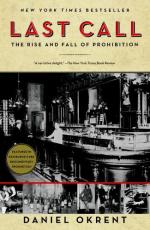|
This section contains 559 words (approx. 2 pages at 300 words per page) |

|
Prohibition
Summary: Provides a historic background on prohibition.
In the early 1900's, many people began to think that alcoholism had gotten out of control. People (mostly women) felt that alcohol was used for the wrong reasons, and that it should be banned in the United States. For example, after work, many men would go to the nearest bar after receiving their paychecks, and spend their money on beer instead of supporting their families. Industry leaders including Henry Ford, John D. Rockefeller, and Andrew Carnegie believed that alcohol decreased their worker's productivity. Others believed that prohibition was needed to protect America's youth from the temptation of alcohol as well as other activities associated with saloons, such as gambling and prostitution.
On January 16th, 1920, the 18th amendment, also known as the "noble experiment," abolished the manufacture, transportation, and sale of liquor, beer, and wine throughout the United States. It was intended to reduce drinking by abolishing the businesses...
|
This section contains 559 words (approx. 2 pages at 300 words per page) |

|


